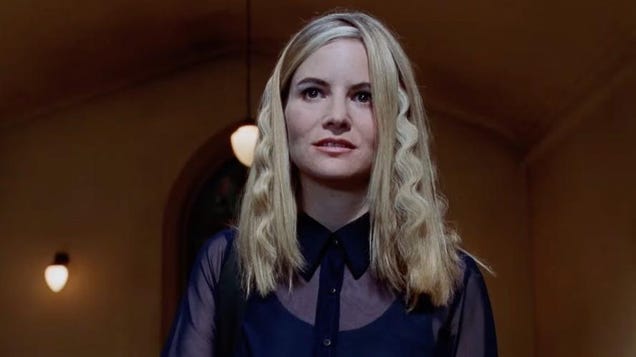
The summer of 2008 was a landmark for superhero cinema. That summer started with the release of Iron Man, the film that kickstarted the Marvel Cinematic Universe. It continued with The Incredible Hulk, the second film in the MCU, and then ended with The Dark Knight, a powerful, provocative, ultra-successful Batman sequel that has influenced seemingly every comic book movie since. But there was another.
It was a film that finished fourth at the domestic box office that year. One filled with concepts and themes those Marvel and DC movies wouldn’t dare explore for years. That movie was Hancock, directed by Peter Berg (Battleship), starring Will Smith, Jason Bateman, and Charlize Theron. It recently was added to Netflix so we decided to give it another watch and see if it stood the test of time.
Having seen Hancock when it was released in 2008, my memories of it were fuzzy. “Oh yeah, that superhero movie with Will Smith…pretty damn forgettable” about sums it up. And when I pressed play, that’s exactly what I got. Within minutes of the film starting, Smith’s character, a booze-soaked superhero sleeping on a Los Angeles bench, sexually assaults a woman, makes multiple homophobic jokes, and is racist toward Asian Americans. Oh boy, this was going to be a ride.
The basic idea of the film is that Hancock is a superhero who doesn’t give a fuck. He’s an asshole drunk who’ll help people with his unlimited, Superman-esque powers, but in the process, leaves crazy collateral damage and everyone hates him. Happenstance introduces him to Ray, a PR expert played by Bateman, who decides he wants to transform Hancock’s public image. In order to do so, Hancock has to pay for his crimes by going to jail, a place he can very easily break out of. Ray thinks the sacrifice will be seen as an act of good faith and begin to change his public image. It works.
Ray happens to be married to Mary, played by Charlize Theron. She’s just a simple mom and housewife who, for the first half of the movie, the camera lingers on way, way too long. All the while, Theron’s acting makes it look like she’s on Saturday Night Live and the direction was “You have a secret.” Which she does. Halfway through the movie, it’s revealed that Mary has the same powers as Hancock; she also holds the answers to all his questions about who he is and where he came from. Due to the unsubtle teasing, it’s not really a surprise—but from there, the movie shifts dramatically. Instead of a meandering, murky mess, it’s now a semi-interesting, mysterious mess.
Truly, Hancock feels like two movies, which is odd considering it’s a very brisk 90 minutes or so. (The length feels archaic when you think about it in terms of the 150 minute Dark Knight and 120 minute Iron Man.) There’s the story of a drunk superhero who rejects the society he has to save—a moral story of what’s right, what’s wrong, acceptance, and redemption; and then there’s a big picture superhero film about a linked pair of immortal gods put on this planet to keep people safe. These heroes who are forced to stay apart because the fate that brings them together also makes them mortal. If they want to live forever, they have to deny their truest, deepest love. If they want to love, they will die.
Each of those stories could certainly be interesting on its own but Hancock just stuffs it all in there like a bad burrito. When there’s too much going on, none of it can come to the forefront and the result is an unfocused film that has loads of potential, but no real follow-through. Very few things in the movie feel cohesive, either narratively or tonally—there’s no awe or wonder at Hancock and Mary’s powers—and the humor is ill-placed and largely unfunny. Family life with Mary, Ray, and their son Aaron works better than almost all of it, but rarely fits with the rest.
At the time of release, I distinctly remember enjoying the first half of Hancock more than the second. I found the idea of a drunken, asshole superhero to be ripe and compelling. Twelve years and 20-plus connected Marvel movies later, now the second half of the film speaks to me more. I watch Hancock and Mary discuss their centuries of life, icons they’ve met, cities they’ve saved, and hate they’ve endured, and I’m fascinated. The idea that heroes are two parts of a whole and their coming together makes them mortal is rich and fascinating. I want to see more movies exploring all of those things. Which, I’m sure, had Hancock not been overshadowed by Iron Man and The Dark Knight, maybe would have come to fruition. As it stands now though, all of those ideas are confined to about 45 minutes of screentime, and that’s not nearly enough.
Looking back at the things Hancock touched upon but never explored fully, it feels almost prophetic. Things like an alcoholic superhero, society rejecting its saviors, a centuries-long story of gods on Earth, these are all themes and stories Marvel and DC would arrive at eventually, but needed to build up to. Hancock was there right at the beginning, swinging for the fence on every one of them and more. Very few of the ideas hit well enough though and the result, unfortunately, is a forgettable, flawed film that will survive more as an asterisk to history than a symbol of it.
Random Musings:
- Hancock is a generic, albeit it appropriate, title, but it’s better than Tonight, He Comes, which was the original name when the script hit Hollywood in the mid-‘90s. That version of this movie was very, very different though, much more R-rated. This article gets into it, as does this one. You begin to see why the title was changed and why Hancock is so unfocused.
- The writing credits on Hancock go to Vy Vincent Ngo, who wrote the original script, and none other than Vince Gilligan. Yes, the creator of Breaking Bad and Better Call Saul. According to reports, Gilligan was one of several writers who did rewrites but added so much, including the mythic superhero stuff in the second half, he was given a credit. Oh, and he and director Peter Berg got into a fight one night and Gilligan left to make a new TV show. That show was Breaking Bad.
For more, make sure you’re following us on our Instagram @io9dotcom.
Source: gizmodo.com








